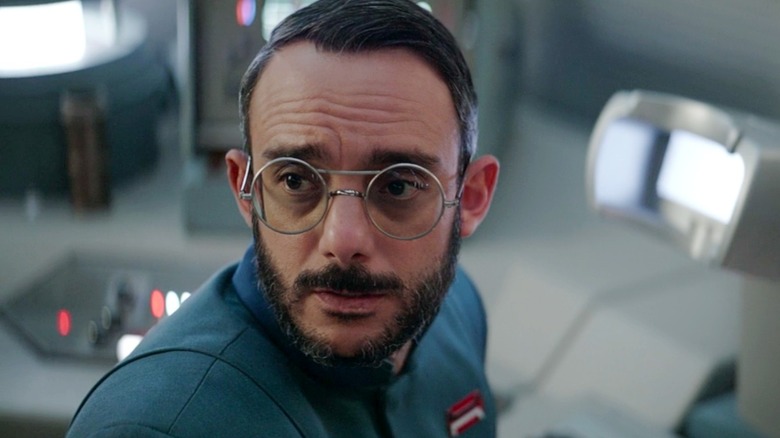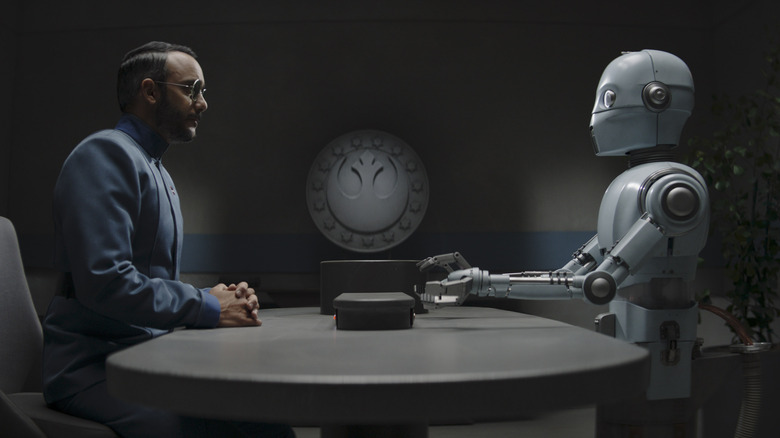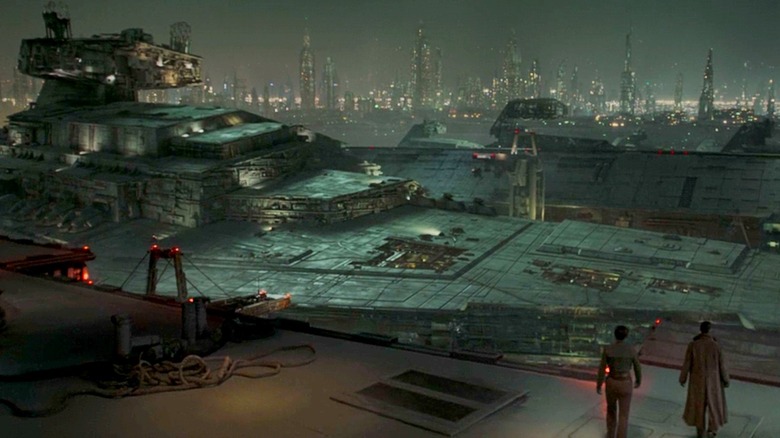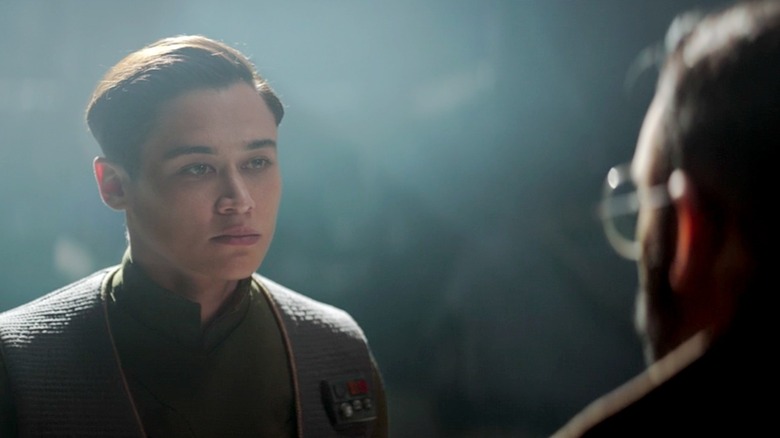The Mandalorian Season 3 Episode 3 Feels Straight Out Of Andor
This post contains spoilers for the latest episode of "The Mandalorian."
Talk about a change of pace. After easing viewers back into the flow of things during its first two episodes of the new season, episode 3 of "The Mandalorian" season 3 begins innocently enough with an extended aerial battle between Pedro Pascal's Din Djarin and Katee Sackhoff's Bo-Katan and a fleet of TIE Interceptors. But then it does something altogether unlike "The Mandalorian" as we've come to know it over the years. We suddenly shift gears completely and proceed to spend the bulk of the hour without any of our usual heroes. In fact, we follow one of the earliest antagonists established in the series: the sinister Dr. Penn Pershing (Omid Abtahi), one of the main architects behind Moff Gideon's (Giancarlo Esposito) attempts to kidnap and experiment on little Grogu.
If such a dramatic change in perspective and setting wasn't jarring enough, then the rather bold choice to avoid any subsequent action at all and instead zero in on the worldbuilding, politics, and moral ambiguity that defines this tumultuous period of time bridging the prequel and original trilogy timelines comes across as even more daring. (The script is credited to writers Noah Kloor and Jon Favreau.) If anything, this storyline hardly feels of a piece with a traditional episode of "The Mandalorian." In fact, it more closely resembles "Andor," the exceedingly well-received prequel series that — if we're all being honest with ourselves — many fans never really thought was a promising idea in the first place.
Yet that's precisely why this hour of "The Mandalorian" stands heads and shoulders above the previous two. By taking its cues from "Andor," "The Mandalorian" goes to places it typically shies away from ... and it's all the better for it.
Tinker, tailor, Imperial, spy
Much like the original "Star Wars" trilogy, "The Mandalorian" has always been a show of broadly-sketched notions of good and evil. Despite Mando's gruff bounty hunter background, meeting an innocent baby Yoda marks a shift in his otherwise ruthless demeanor as he's finally given a reason to care about someone outside himself. The villains haven't exactly been very subtle or complicated either, symbolized by Moff Gideon's single-minded desire to exploit Grogu for his nefarious purposes. What you see is, for the most part, pretty much what you get.
At least, that was the case until this latest episode of "The Mandalorian," which keeps viewers firmly rooted in the struggles of one individual, Dr. Pershing, adjusting to a whole new reality as a rehabilitated Imperial. Under the Amnesty Program, former members of the Empire deemed worthy of redemption have undergone significant retraining so that they may become contributing members of the New Republic. But similar to "Andor" focusing heavily on the loathsome Syril Karn (Kyle Soller), episode 3 uses Dr. Pershing in Coruscant to explore the cogs within the machine of this new galactic government. While both characters have their own very distinct motivations and ambitions, their roles in each respective series closely mirror one another — showing how much their ties to the Empire can't be easily shaken.
Unexpectedly enough, "The Mandalorian" shows a willingness to tackle nuanced shades of grey like "Andor" did. By posing the question of whether good intentions can make up for past crimes, viewers are challenged to reckon with a point of view that isn't easily defined. We know that his past actions can't exactly be seen as justified, but isn't he right that cloning and other technological advances could have positive results in the right hands? That, however, is only the beginning.
Out with the old, in with the new (Republic)
Despite taking place during one of the most fascinating moments in "Star Wars" history, "The Mandalorian" has never seemed all that interested in truly exploring this chaotic time period. The ramifications of a galaxy recovering from the Empire's downfall and the enormously complex process of building something new out of its ashes are almost mind-boggling, but so far we've only received hints and teases of the surviving Imperial stragglers and the New Republic's presence, appearing only on the distant outskirts of Mando's adventures when he happens to run into bothersome New Republic pilots or the occasional Stormtrooper.
That is until season 3 episode 3 of "The Mandalorian" fully commits to its worldbuilding in a way we've rarely seen before. Here, the show takes its biggest risk yet. After the good doctor's TED Talk early on, his subsequent interactions with Coruscant's high society adds a fresh new context: The disinterested upper class hardly see any difference at all between how The New Republic runs things and how the Empire used to do so. Although the oppressed masses under the thumb of Palpatine and Darth Vader would likely disagree, even that notion is further complicated after Pershing's attempts to continue his genetic research with the help of fellow reformed Imperial Elia Kane (Katy O'Brian).
Encouraged by what he presumes is a likeminded "The ends justify the means" approach, Dr. Pershing eventually accepts Elia's help in breaking into an old scrapyard for necessary equipment. When it turns out that Elia was setting him up the whole time, Pershing's arrest and punishment uncovers the hypocrisy at the core of the New Republic. They do away with all traces of the Empire publicly when convenient (such as those Star Destroyers), but secretly employ the same torture methods.
Converts to the cause
The parallels between this last episode of "The Mandalorian" and "Andor" don't stop there. If Pershing and Syril are two sides of the same coin, then the brutally efficient methods of Elia can't help but call to mind Stellan Skarsgård's Luthen Rael, a shadowy Rebellion operative who compromises all of his morals in service of a greater cause. Though we have yet to see exactly why Elia turns so decisively on Pershing — whether stemming from a personal grudge dating back to their shared history on Gideon's starship or because of her staunch adherence to the New Republic's new vision for the galaxy, simply trading one regime for another — the episode ends this storyline on a wildly disturbing note. Though we've been conditioned to view Pershing as a villain, Elia takes on an even more frightening aura when she personally tortures her would-be friend.
While we have two seasons of evidence suggesting that this episode of "The Mandalorian" is likely to remain an outlier and not necessarily an indication of a marked change in storytelling priorities, the results are nonetheless encouraging. No show can afford to stagnate by relying on what's worked in the past. As much as audiences clearly can't get enough of the antics between Mando and Grogu, it speaks volumes that Favreau and the creative team had the creativity and presence of mind to sideline our two main protagonists and relegate them to bookends of the episode, using the rest of the precious screen time to bring up some (relatively) weighty themes — ones that "Andor" definitively proved could be both entertaining and meaningful.
"Star Wars" need not be boxed into any one mode of storytelling. But for one episode, at least, "The Mandalorian" channeled the best of "Andor."



